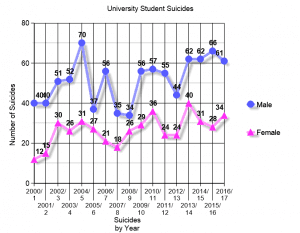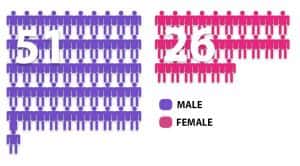Recent data published by the Office for National Statistics has triggered a raise in concern, across many mental health organisations, over increasing University student suicides.
Data shows that there has been a steady increase in the number suicides among UK university students since the year 2000, specifically male undergraduates.
According to a representative of Universities UK, there are currently 2.3 million people studying at UK universities.
Nationwide, since the start of the millennium, there has been an average of 78 university student suicides per annuum.
Undergraduate suicide rates have risen from 3.1 (out of every 100,000 students) in 2000 to 4.7 in 2017.

(Graph made by Louise Forsyth using Data published by ONS)
The data also clearly illustrates a much larger unforeseen issue; the substantial gap between male and females who are taking their lives.
As visualised below, between 2000 and 2017 there has been an average ratio of 51:26 student suicides (male to female) yearly among UK universities. Organisations and universities alike are raising concerns over the lack of support for male sufferers.

(Graphic made by Louise Forsyth with statistics made from ONS data)
The inability to raise their voice and reach for help is said to be the biggest barrier for male sufferers, due to the large stigma attached to men showing emotion and the impact of talking about suicide in general.
Stephen Buckley, Head of Information at Mind, states:
“We lose almost 6000 lives a year to suicide and every one is a tragedy. Not all suicides are mental health-related but the majority are and we know too often people, especially men, struggle in silence and find it difficult to know how to ask for help.”
“More needs to be done to ensure everyone feels able to seek the help they need so fewer people reach crisis point for their mental health.”
Rosemary Vaux, representative of PAPYRUS, an organisation created to provide advice and support specifically for young people indicates that women are “usually more comfortable talking with friends about how they feel.”
She suggests that many men, especially young men, avoid seeking help as they are conditioned to believe they should be strong and “able to cope.”
“It is not as easy for them, therefore, to share how they feel.”
“Since men are still three times more likely to take their own lives than women, our work is certainly not done.” says a representative of Samaritans.
This issue is very close-to-home for Dean Frame, a student at the University of Sunderland, who agreed to talk about suicide and his own personal experiences with the stigma around it.
“Looking back, the hardest thing for me was trying to push myself to get help. I felt shameful.”
Dean planned to take his own life but recently sought out help for his mental health.
“There is a real stigma around suicidal thoughts and men who aren’t as hard-shelled as society wants them to be.”
“Talking about suicides remains as cancer was about 30 years or so ago, when people referred to the big C.” says Vaux.
Dean and organisations such as Mind encourage friends and family of those feeling suicidal to not be afraid to ask “are you suicidal?”
“I was so close to giving up and felt like there was no where to turn till mate of mine noticed my behaviour and reached out to me.”
Universities are also encouraged to get involved in preventing young students taking their own lives:
“We urge university leaders to work with their student support services to develop a strategy which focuses on preventing, intervening, and responding to suicide as part of an overall mental health strategy.” says Professor Steve West, Vice-Chancellor of UWE Bristol and Chair of University UK’s Mental Health in Higher Education Advisory Group.
Samaritans expressed their concerns over the increase in suicides among students and call for a more detailed and honest data collection on deaths by suicide to help promote changes.
Leah Parker-Turnock, from Mind, shared:
“There are lots of different reasons why students might experience difficulties with their mental health, but university life poses some unique challenges. People might be expected to take on the role and responsibilities of an adult, but they may well have left behind all the social and organisation structures they relied on for support.”
Mind encourages students to get adequate sleep, exercise, keep a balanced diet and have frequent sober days:
“If anyone around you is suicidal, offer reassurance, be patient, keep contact, encourage self-help and seeking advice.”
This is a short video provided by PAPYRUS to help anyone suspecting a young person is suicidal:
If you or anyone you know is experiencing suicidal behaviour, please do not hesitate to contact 999, Mind, Samaritans (116 123), PAPYRUS, or your local NHS ran service.



